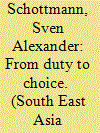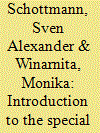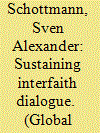|
|
|
Sort Order |
|
|
|
Items / Page
|
|
|
|
|
|
|
| Srl | Item |
| 1 |
ID:
130575


|
|
|
|
|
| Publication |
2014.
|
| Summary/Abstract |
A content analysis of print advertisements and customer websites of Islamic banks in Malaysia, this paper examines the changing marketing and branding landscape of Islamic banking products and financial services. When Islamic banks were first set up in Malaysia in the early 1980s, their advertising material emphasized the religious obligations of Muslims to save and invest with shari'a-compliant financial products and services. Amid the ongoing liberalization of Malaysia's Islamic banking sector since the mid-1990s, a transformation of this marketing strategy appears to have taken place. Islamic banks no longer emphasize a priori the religious imperatives or even the ethical principles that underlie their business model. Rather, they tend to stress that banking according to the principles of the shari'a is an economically rational alternative to the conventional system. Islamic banks in Malaysia portray themselves not simply as Islamic banks, but as better, more profitable and safer alternatives to the crisis-prone conventional, interest-based banking sector. This paper examines this transformation, and seeks to relate the three broad trends it has identified in the advertisement of Islamic banking services to the wider socio-cultural, economic and political changes that have been under way in Malaysia since the late 1960s.
|
|
|
|
|
|
|
|
|
|
|
|
|
|
|
|
| 2 |
ID:
125025


|
|
|
|
|
| Publication |
2013.
|
| Summary/Abstract |
The second half of the twentieth century witnessed the rise of what might arguably be described as political religion, with faith traditions everywhere experiencing parallels to the rise of Hindutva in India or the 'muscular' and virulently anti-minority political Buddhism of Sri Lanka and Myanmar. Similarly, Israel, a country founded by cosmopolitan, social-democratic nineteenth century perceptions of Jewish 'national' identity, is increasingly struggling with its ostensibly secular founding ethos. Religiously conservative political parties and attitudes have become mainstreamed in Israel's political landscape in the last couple of decades.1 What might help account for these seemingly similar developments, all of which appear to contradict the basic dictum of secularization theory, namely that increasingly prosperous, urban and industrialized societies will relegate religion and religious practices to the private sphere of a personal 'faith'? Until recently, the assumption persisted that the historical experience of Western Europe, the first part of the world to undergo industrialization and the wider sociocultural effects associated with the process of 'secularization', would be replicated as other parts of the world modernized. An important debate has ensued over the past 20 years or so, involving scholars representing a wide range of disciplinary backgrounds over what appears to be the revitalization of religion and even possibly processes of de-secularization.
|
|
|
|
|
|
|
|
|
|
|
|
|
|
|
|
| 3 |
ID:
125063


|
|
|
|
|
| Publication |
2013.
|
| Summary/Abstract |
Present-day Australia is often described as a successful example of a modern multicultural state. A growing number of non-British and non-European migrants have helped transform the country into an increasingly plural society. Intolerance and even outright racism persist in a few sectors, but on the whole, Australia's political, cultural and intellectual elites have accepted the need for migration, even if they have not always rushed to embrace the concept of multiculturalism. The most cursory of surveys of Australian cities, suburbs and even rural areas would readily reveal the extent to which the country has changed from the days of the 'white Australia' policy. Ethnic and cultural pluralism are just two measures of this new social pluralism; the growing diversity of religious expression is another very important dimension of Australia's multicultural reality. As Michális S. Michael points out, a key 'antidote to the politics of fear' has been the range of interfaith and multi-faith councils and networks that were set up in the course of the last 10 years. Some of these efforts were, in part at least, driven by what Joseph Camilleri describes as a 'narrow understanding of social cohesion' undertaken 'in the hope that dialogue would more effectively integrate [Muslims] into the mainstream'.3 They reflect still common views of Muslims as a 'problematic' minority prone to radicalization and the tendency to self-segregate. Nonetheless, these efforts of facilitating engagement across religious lines are a belated recognition of the social, economic and political significance of Australia's religious diversity, indeed of the enduring role religion plays in the modern, secular world.
|
|
|
|
|
|
|
|
|
|
|
|
|
|
|
|
|
|
|
|
|